#and the inevitable creepy posts about the two female leads
Explore tagged Tumblr posts
Text
Less favourite hobby: watch people on tumblr complain loudly about creators not writing non-white/female/queer/old/disabled characters while also reblogging the same three gifs [two attractive & straight & white men staring at each other and then one looks away and maybe there’s sadness in his eyes now because of a deep, untold secret between them also they both have abs] over and over again.
#tumblr problems#writers problems#pet peeve#rant of the day#old woman yells at cloud#just finished tms#and loved it#wanted to have it on my dash#turns out there's like five posts out there#three are edits of jennifer aniston's hair#one's a ficlet that's like???!?#did we even watch the same show#then a few shots of the two most attractive male characters looking broody#and the inevitable creepy posts about the two female leads#(i ship them!)#like wtf#you say you want powerful stories#bechdel test and whatever#but hot fanart of two pretty straight men making out#will always have more reblogs#mh
31 notes
·
View notes
Text
Kdrama Sexist/Toxic Male Lead Tropes
(originally made this post as part of another post about Run On but it got to be so long I just thought I’d made this list it’s own post)
-Possessive and easily jealous, and this is often played off as romantic. For a large portion of kdrama watchers who are younger, and for the majority of us who aren’t chased all the time by hot men, this toxic trait can easily be sold to us as an exciting and flattering trait. But this is in fact not respectful of the female lead’s autonomy. I enjoy the little humorous jealousy moments, (I am reminded of Crash Landing on You) but too often this leads to the classic “two male leads each grab the innocently wide eyed female lead and glare at each other” trope. Women are not ropes to play tug of war with! If jealousy over the instances like the girl simply having a conversation with another guy rupture into real problems in the relationship it is not romantic, but possessiveness is often mistakenly portrayed as an expression of love, when really possessiveness is just that: possessiveness over an object.
-Uses violence to solve problems. This is another thing that can be easily seen as flattering--someone is willing to go to great lengths to protect you/defend your honor/whatever the reason is for the male lead to use violence. This trope was deconstructed in the American movie 500 Days of Summer, where the male lead punches a guy “to defend the honor” of the female lead, but she when she is upset and embarrassed at the situation, he gets angry at her for not being excited over his violent sacrifice.
-The typical “tsundere” narrative of abusive language, but paired with romantic gestures, usually the Grand Romantic Gesture trope. I see this all the time, where the guy berates the girl, sometimes to point of just full on bullying, but then he throws his jacket at her when she’s cold, holds the umbrella over her while he gets wet, etc., In other words he may be verbally abusive but it doesn’t matter because he Truly Loves her. And that she should accept that and understand that about him and not expect him to be polite and respectful.
-He treats everyone but the female lead like trash. Well...he often treats the female lead like trash at first too, but this quality is also marketed as flattering. He treats everyone badly but you’re different! In reality this is super toxic. In fact, it is essential that a person treats *everyone* with decency if they are to meet the baseline requirements of being a person capable of giving and receiving love in a healthy relationship.
-He chases her one sidedly. Oftentimes he chases her even when she rejects him, which shows that dominating, male persistence is a behavior to be rewarded. Again, this is a fantasy easily marketable when many of us aren’t chased around by hot men. It is flattering for a person to be so interested in us that they are incredibly persistent, but this fantasy had very unhealthy, and even harmful real life connotations. There is a very important line between friendliness/respectful attention/flirting, and creepy and domineering. I think it is also equally important to note that in this toxic trope, it is important to teach both men and women that no means no and yes means yes. Not that you can’t have playful/teasing banter, but playing hard to get when you really want to be gotten, is an unhealthy coping mechanism for cowardice in relationships.
I think for this one as with other tropes on this list, it appeals to our childish, insecure, and relationship-immature side of ourselves that would rather have everything fall into place than be honest, vulnerable, and have agency in our romantic interactions. What I mean is, the fantasy of a hot male lead persistently pursuing us after a destiny meet cute is a fantasy where we don’t ever have to put ourselves out there. Where don’t have to consciously try to meet new people, express interest in others, set boundaries, i.e. do the hard work of negotiating our place within other people’s lives.
The hallmark of a bad drama for me is when the give and take between the male and female lead is: the female lead has to put up with the meanness and constant mistakes of the male lead as he hurts her (usually in tangent with the Noble Idiocy trope, where he breaks up with her and steps all over her “for her own good” for some bs reason), but in return she gets the Grand Romantic Gesture, and the male lead does most of the chasing. In a healthy relationship, there aren’t constant hurtful arguments, and both do an equal share of the “chasing,” or a better term would be meeting each other halfway in expressing interest in the other.
-Power imbalance. It really disturbs me how Kdramas fetishize power imbalances between male and female characters to create the helpless/incompetent/somehow indebted but also plucky/cheerful/abuse-taking female lead. This can manifest itself very overtly in the many Kdramas between CEOs and secretaries, which I still cannot believe are popular in 2021. Secretary Kim did a better spin on the usual trope--the secretary holds the power of being very good at her job, and therefore indispensable and respected in her own right, but it remains a mystery to me why these super narcissistic and childish CEOs are played off as “adorable manchilds” that always need a little soothing of their ego. But to return to the power imbalance, besides obvious power imbalances of wealth/power/etc., oftentimes the guy has supernatural powers, or by nature of his job has abilities that render him the “protector” in the relationship (My love from another star, descendants of the sun), or the girl is infantilized in some way to need to protection from the male lead (legend of the blue sea, she is a mermaid and therefore dependent on the male lead for guidance in the human world, bring it on ghost as well). I think these latter power imbalances are constructed into the setting of the story because more overt forms of power imbalances are frowned upon now, but they serve the same patriarchal purpose.
This power imbalance inevitably leads to the female lead putting up with some abuse from the male lead because she “needs” him for some other end, and him holding his power over as a way to keep her close. It fits very well into the enemies to lovers trope in this way, especially some contractual enemies to lovers, where due to the power imbalance he is able to exploit/use her in some way, and keeps her close, and she hates him but has to put up with it for her own survival in some way, but they slowly fall in love. It’s super toxic and not at all romantic because they didn’t choose each other at all, they just were pushed together by circumstance, but again it buys into our fantasy of falling in love due to circumstance, rather than our own agency.
-Overly protective (OP) vs respectfully supportive. (RS) Essentially I can divide Kdramas into these two categories, OP and RS. OP romances can commonly be found in love triangles (where jealousy flourishes) and high school romances (where characters usually have less of a personality lol), and RS relationships are more common in working adult romances, where each character is pursuing their career/dreams and they support each other in those dreams. OP relationships infantilize the female character, render her as just an object in need of saving, and power dynamic between the leads is usually he constantly needs to save her, and in return she “softens”/“heals” him which, under deeper analysis, reveals itself to be quite an insidious and harmful stereotype, the kind of psychology that keeps women in domestic violence relationships. RS relationships are also better in that the leads have something going on outside of their romance, and are motivated beyond just ending up together. My favorite of RS relationships are Miss Hammurabi (two judges that work together to confront injustices in the judicial system), Run On (two leads from v different career fields, but they take interest and support each other throughout career ups and downs), and Hello My Twenties (probably my favorite example of an RS male lead--Sungmin supports Song as she uncovers her past traumas and stands up to an abuser, but does so following her lead and not doing her work for her, but rather simply staying by her side supportively).
Conclusion
This is not all the toxicity in the kdrama world--this is just what I can come up with off the top of my head as my least favorite tropes that disempower women and glorify toxic men and toxic relationships. And of course this is not a problem unique to Korea, and is by no means a condemnation of Korean culture, etc., but I simply happen to enjoy the aesthetics and innocence (compared to American shows haha) of Kdramas, so that is the entertainment world I am familiar with, and feel able to comment on.
113 notes
·
View notes
Text
FUCK YOU TIME! I’m aware I’m an hour and a half late, but I finished the chapter, so HA. I know nobody cares, but I’m happy with myself. Previous chapter is at the bottom of the page, of course.
Chapter 4
"Why, pray tell, don't you trust me?"
"Because you're being paranoid." Mikey gets into position at the top of the ramp as you scroll through your phone absentmindedly, watching your friends back home sincerely mourning your death. "I am an ex-peer-ee-onsed skateboarder and ninja. This is gonna be epic."
"As someone who saw that episode," you reassure him, sighing at your mother's inactivity online confirming your suspicions for the umpteenth time, "you are absolutely going to get in trouble." The lair is a mess, the ramp more so, and the entire situation is so obviously the inciting incident that you're half convinced that the universe itself is pranking you. You slid the phone into your pocket, not really in the mood to start crying again. "In fact, this is directly related to the theme of the episode. In other words, don't do it."
"Relax, dude." He sets himself up. "I am totally gonna make this jump and it is going to be sweet."
"Theme?" Donatello pipes up from his place on the ground in front of the ramp. "The first major constituent of a clause?"
You blink. "No, the new Subway footlong. What the fuck are you talking about?"
"That's the definition of theme."
"Who uses that definition? Grammar teachers?"
"The dictionary."
You are dumbfounded. "Why would I— do you know how people usually use that word?"
"People usually use that word at all?"
You look over at Raphael and Leonardo, who are on the floor next to him, and who seem completely disinterested. "Do you guys—"
"No. Who uses the word 'theme'?" Raphael rolls his eyes. "Mikey, do you plan on jumping today?"
"Wait, so none of you have ever used that word in a literary sense?"
"There's a literary sense?"
You sigh. "In hindsight, I guess that makes sense, since— Mikey, you're gonna get grounded for it."
"Will not."
"Will too. Donnie, when you inevitably get grounded for this, after your grounding is over, come to my apartment. I'm teaching you literary analysis because that is ridiculous." You get to your feet. "Oh," you say, "before I go, when he grounds you, don't go out. If you get into trouble while you're out, get me, and if he asks why you're tired, say it was a movie marathon, and if he asks which movies, Lord of The Rings. See ya." You run out as you hear the shouts of their father telling them to stop.
You walk back up to the surface via the empty subway tunnel. You had quickly realized that it was infinitely less gross than going through the sewers, and your apartment already smelled enough like raw sewage from the amount of time you had started spending down there. You have considered buying new clothes with your quickly appreciating bank account, but you could not bring yourself to look, even with your new freedom. Maybe it was a lack of motivation? You do not exactly know. More likely is your complete lack of inspiration and faith in your own choices, but what do I know?
You start down the street to your building. You would not go so far as to say it felt like home, but you had become more accustomed to it. You had learned the bellboy’s name, nodded to neighbors. It is not a stunning amount of progress, but it is progress. You spend most of your days now, if not re-watching whatever episode is relevant next, for the first time, cyberstalking people you knew from back home. How courteous of that organization to give you an up-to-date feed of life moving on without you; at least you get to see your cousins.
You do not remember the actual walk. You remember getting to your apartment, walking right by your refrigerator, and collapsing onto the bed.
You feel like shit.
You roll onto your back, going right back to stalking. You are not sure why you bother making yourself feel worse. You tried messaging them to absolutely no avail. You cannot comment on posts, either. You know this. You still grasp onto this shred from your past. It just makes you sad. Why are you doing this to yourself?
You feel a lump rise in your throat. You close the window.
You curl around your pillow, hugging it tightly. You the sound of your fingers against the screen was the only thing to permeate the room. You are following a tangent, looking for a book you were interested in a century ago. Something about a pervert? You forget.
You miss home.
—
You do not even need to look up from your phone; the panting is enough. "I'm going to take a wild guess."
"I know you said to come get you," Donnie gushed, "but it was 2 in the morning and I totally forgot and I was freaking out about this new invention and—"
You set the e-book down, walking over and grasping his hands gently. "Take a deep breath, alright? You're gonna be fine, so long as you chill out and think."
"Baxter Stockman is serious business."
"I know, honey, but you gotta calm down, alright?" You slowly pull him down to sit on the bed.
"He snapped my staff with his freakin hand!"
"You are going to go through at least 2 more of those bad boys. Breathe with me." You inhale deeply. "In."
He mimics you.
"Out."
He follows suit.
"Okay. Are you good?"
His breathing slows. He swallows, nods. "Okay, I'm calm."
"Awesome. Now, I'm gonna give you a mini version of our lesson, alright? Is that okay?" The irony of you trying to calm down the trained ninja is not lost on you.
"Yeah, alright." He nodded.
"Alright. Let's start off with the basics." You sit yourself up properly. "Now, this is a kid's show, right?"
"If you say so, yeah."
"The thing about kids shows is that there's usually a moral to each of the episodes."
"Okay."
You put up one finger. "At the beginning of the episode, you guys got grounded, right?"
He nodded.
"You guys snuck out, and you got into a fight with Stockman. That fight is the reason he's after you, right?" You try to speak relatively clearly and, more importantly, calmly.
"Yeah." He seems to respond relatively positively to this.
"And then,” you continue, putting up a second finger, “Mikey losing the t-pod and not telling anyone is what lead to Stockman getting powerful, right?”
He nodded.
“In both instances, the problem was a lack of transparency, right? Not asking for help for fear of getting in trouble?”
He nodded again.
“So,” you nod with him, “the way to fix this is?”
“To ask for help regardless of whether or not it will get us in trouble with Splinter?”
“Exactly.” You smile encouragingly. “Why?”
“Because that’s the message of the episode?”
“You really are quick to catch on.” You get to your feet. “I’m not surprised you’re the brains of the group.”
“Really?” His eyes lit up.
“Most definitely. Now,” you get to your feet, “as much as I love when we talk, and as much as I owe you a lesson on how to identify these sorts of things on your own, I’m sure your brothers could use that advice right about now.”
“Right!” He gets up. “Thank you, again.”
“My pleasure, my guy. Oh, hit me up when you’re off of your grounding so I can figure out a lesson plan.”
“You got it.” He climbed out of the window. “See you then, Y/N.”
“Kick their asses.” You wave as he disappears into the night.
Your smile slowly slides off your face as you close the window. You pick your phone up to check the time.
You toss it onto the bed. ‘I’m making cupcakes.’ You have not eaten in what feels like a while. You are already out of bed. Might as well.
--
“She called me honey.”
Raphael rolls his eyes. “I’m telling you, there’s no way that a girl like her is going to be into you. You’re delusional.”
“Honey is a pet name!” Donatello’s voice rises slightly. “And—and she invited me to her place after we aren’t grounded!”
“Let him believe.” Leonardo pipes up from in front of the television. “I think it’s nice that he and she are as close of friends as they are so quick.”
“For the record, I’m rooting for ya, bro.” Mikey takes another bite out of his pizza. “Sure, you’re a little creepy, but so is she, so it works out.”
He scoffs. “Aren’t you three forgetting something? Like, I don’t know, that we’re turtles? Is the fact that she’s an entirely different species not a factor?”
“Part turtle.” He speaks incredibly fast. “Our DNA is mutated with—”
“Oh, I’m sure you’re holding onto that technicality real tight, aren’t you?” He stabs the dummy in the gut. “A technicality that I’m sure she cares about.”
“I did the research.” He gets to his feet, running over and grabbing a diagram from his lab. “We’re physically compatible.”
“Donnie. Brother. No.” He stops. “Please tell me you didn’t seriously look into whether or not you could fuck her. I know you like this girl, but come on.”
“I didn’t go out of my way to research how our reproductive system works for this.” He tosses it back into his lab, sliding the door closed. “I did that research a while back. I just had to investigate reproduction on the female end to make sure everything worked.” He stands up straight. “Theoretically, we are fully capable of reproducing with humans.”
“Theoretically?” Leo looks back at him.
He feels his face go red. “Well, there isn’t any clinical research done on the subject. We’re the only ones of our kind, after all, and I don’t have any female samples to use.”
“For fuck’s sake, Donnie, do not ask her for ‘samples’.” He gags. “That’s just fucking gross.”
“I wasn’t going to!”
“You were. I’d bet money on it.”
“Ten bucks says he still will.” Mikey drops the rest of it down his throat.
“Hey!”
“Dude, you’re freakier than I am. I love you but come on.” He lays back on the couch.
“Y’all are just gross.” He stabbed the dummy in the neck, sand pouring out of the hole. “We need a more durable dummy.”
“You could just not break the ones I make.” He sits down on the couch. “That’s an option.”
“It’s a literal punching bag. It’s a show of love.”
The episode ends. Leo walked over to the two on the couch, sitting on the other side of his lanky brother as Michelangelo scrounges for crumbs. “Look, it might be jumping the gun a bit to start researching if you guys can have kids. You guys aren’t even in a relationship.”
“I know.” He rubs his face with his hands. “I dunno, man. What am I doing?”
“Exactly.” He pats him on the back. “I’m not saying it could never happen, but this is a little much.”
He sighs. “Yeah, that’s true.”
“We wouldn’t lie to you.” He gets to his feet. “I’m gonna go meditate for a while. You wanna join me?”
“I’m good.” Donnie hopped over the back of the couch. “I’m gonna go work on this thing I’ve been working on.”
“Alright, man.” He walks off to the dojo.
He steps into his lab, sliding the door closed behind him. He sits at his workstation, a half-finished robot sat on the table. He slides his tongue in the space between his teeth absentmindedly as he goes back to connecting wires.
‘She used the past tense. Had, she said.’ He bounces his knee absentmindedly, reaching for the soldering iron. ‘But she called me honey. She called me hot stuff. Is that an insult?” He tests the joints. ‘I don’t remember.’
He sets his project down for a second. He opens his laptop, smiling gently at his screen saver. It is a photo you had emailed him of the two of you to show you how it worked.
‘I should make a camera. Or find one. A digital one.’ He sighs, closing it. ‘She is absolutely gorgeous.’
He goes back to work, still feeling your fingers around his.
Table Of Contents
Chapter 3
Chapter 5
#donnie x reader#donatello x reader#2012 donnie#donatello#tmnt donatello#teenage mutant ninja turtles 2012#tmnt donnie#tmnt fanfiction#tmnt 2k12#tmnt 2012#fluff#angst#2000+ words#x reader#if i add more tags will people see this more often?#I dunno#I mean#I’d feel bad if people didn’t like this for whatever reason.#Sunday?#nyc#pizza#apartment#red velvet#red velvet cupcakes#baxter#baxter stockman#skateboard#I can’t turn back now. we’re on page 27 in my word doc.#that’s 10955 words. longest time I’ve stuck with a thing since 7th grade.#the y/n is most certainly going to die. you know the episode. I’ll release that chapter separately
34 notes
·
View notes
Text
Anti-Fujoshi = Anti-m/m content
mynameismichealwithab
reblogged your post
“A New History of Fandom Purges”
thezedmynameismichealwithab reblogged your post “A New History of Fandom Purges”#dont agree with the anti fujoshi stuff leading into anti mlm stuff (a lot of anti fujoshis are mlm themselves) but everything else yeah
What I actually said was: “This is why anti-fujoshi policies end up being anti-m/m policies.”
I wasn’t using "men who love men”. I rarely use that term unless I’m directly quoting because it sounds like a creepy medical study, and it’s beloved by TERFs who hate on the term ‘queer’ because it’s too inclusive. If I mean “gay and bi men”, I’ll just say that. Normally, I say “queer men”.
(And don’t start on that “Q slur” shit with me. That’s a TERF thing.)
What I actually mentioned was “m slash m”--i.e. content that has a pairing of two dudes.
There are several issues with Tumblr’s anti-fujoshi crusade:
1. There is no functional difference between the people complaining and the people being targeted. All of the people involved tend to be fans of the type of m/m content that is primarily aimed at women.
2. Hating on “women” who like BL, slash fanfic, and other m/m content inevitably means forcing closeted trans men to come out before they’re ready. That’s shitty even aside from the usual level of heinous misogyny in anti-fujoshi rhetoric.
3. MISOGYNY. Woooowwww is tumblr misogynist. “Fetishizing” in tumblr land appears to mean any time any woman has a sexual thought. Anti fujoshi posts boil down to “I don’t want icky girls getting hot and bothered over the same things I do.” No, it’s not about squealing teenagers being unpleasant to gay men or to actors they find hot in person. I’ve seen that behavior, and it’s gross, but it’s standard moron teenager behavior and isn’t any more or less common just because someone likes BL. Men are ten thousand times worse at celebrities they like and at random f/f couples in bars, but somehow it is women who are the scary ones? Okay, sure.
4. Cis gay male culture hates all of us or ignores all of us or at least fails to cater to any of us. The queer men on tumblr who are pissed about “fujoshi” aren’t any happier consuming m/m content aimed at a cis gay male audience than the rest of us are.
There are other spaces with gay media by gay men for gay men. Tumblr, in general, dislikes this media and prefers to hang out in female-centric spaces, complaining that there are too many women.
What it boils down to is that the type of m/m content that Tumblr likes is primarily made by and for women.
M/M fanfic would not exist without this female community.
AO3 would not exist without this community.
“M/M romance” as a genre in English would not exist without this community.
BL manga would not exist without this community.
Yuri on Ice and its ilk would not exist without this community.
That does not mean that you have to be a woman to like any of this stuff. It just means that your community would not exist without “fujoshi”, so hating on them is stupid and counterproductive.
Trying to “cleanse” a space of “fujoshi” would inevitably lead to there being less m/m content. That is often the secret objective of anti-fujoshi rhetoric. Well-meaning idiots join in, thinking they’re protecting queer men, but that’s not how it plays out in practice.
161 notes
·
View notes
Text
The Long Carmilla Post 2 - Return of the Long Post about the Queen of Lesbian Vampires
When Tumblr tightened its policy about censoring nudity, they targeted a long post I'd made about Carmilla, since I showed photos of Ingrid Pitt and Yutte Stensgaard with their bare breasts in it. I have now censored the post, edited it and added a little. Carmilla is my favourite vampire of all time, and I have a long history with her different incarnations, so I wanted to bring the Long Carmilla Post back.
When I first posted the Long Carmilla Post, I had just seen the movie made by the Carmilla webseries folks. The sudden fame of the webseries surprised me. I can't help but think, that there must be a lot of new Carmilla fans, who instantly think of Natasha Negovanlis when they hear that name. If this series had been around when I was a teen, damn, would I have loved it! I would have been obsessed with it. But it was not, and I can't really become as obsessed with it now as the new fans do. Because when I hear the name Carmilla, several different faces appear in my imagination. I have already been obsessed with Carmilla from a rather young age, and while I love the webseries and this movie, for me it's just one of Carmilla's newer incarnations, not her default form.
I don't want to sound like a hipster (”I liked Carmilla before the webseries made her cool!”), I just thought that as a lesbian vampire lover I should make a post about my favourite vampire, and the history I have with the character.
There are some images of blood under the cut.
When I was younger, there really wasn't any lesbian litterature around (well, there probably was but I didn't know what books to search). I had a habit of switching genders in the books I read, making everyone female so I could get the girl romances I craved for, but this always felt forced and not ”real.” I read lots of vampire stories, because I've always loved that genre, but it was very much dominated by stories of male vampires. When I read Dracula, it had a short introduction speech that talked about the history of modern vampire stories, and it mentioned Sheridan Le Fanu's Carmilla.
Tracking the novella down was a bit hard, considering that back then I didn't have internet and so could only read books that I found in the library and bookstores. Fortunately the translation of Carmilla was included in one horror anthology that our library had. I managed to get my hands on it, and this cover illustration was the first ”face” of Carmilla that I knew.

I can't really put a finger on why I became so obsessed with this story. It's not that great of a novella. A very basic old-timey vampire story about a monster who threatens the life of the protagonist, who is saved when the monster's true nature is revealed, after which it is hunted down and destroyed. And the lesbian subtext is very, very subtle. There was just something very mysterious and fascinating about Carmilla. She is still among the few vampires who actually frighten me. Though Le Fanu's story isn't very scary by modern standards, Laura's nightmare scenes somehow got under my skin. There's something very creepy in the way vampires in older stories used to steal blood from their victims while they were sleeping. The idea, that there exists a predator who instead of straight up attacking its prey, approaces it by a cover of flawless mimicry, is horrifying. You are being slowly eaten alive and you're not even aware of it happening, or that it's your charming friend doing it to you.
I started having dreams about Carmilla. The first ones were nightmares, but even if they were scary, they didn't make me anxious, just excited. I was scared of Carmilla, but I wanted to see her, I wanted to hear her voice. It was as if I had fallen under her spell, much like Laura, but unlike Laura, I was aware of her true nature. I knew what she wanted, I knew that in my dreams, her kisses would lead to bites. But to a young lesbian who loved vampire stories, those kisses were worth losing a few drops of blood in the dream kingdom. She was one of ”my people.” She was not a genderswapped male hero, she was ”real.” She genuinely loved women and blood, and I loved her.
Halloween isn't really celebrated where I live, but one October a friend of mine decided that she'd hold a Halloween party (which became a yearly tradition for us for many years to come). She invited a group of her friends to watch horror movies at her house, and everyone should wear a costume. There was no competition what I would go as. I had a light blue dress that I decorated with blood stains, and over it I wore a dark gray cape, on which I had painted purple flower patterns to make it resemble the coat Carmilla wears on the cover illustration. It must be almost twenty years old, but I still have that cape.
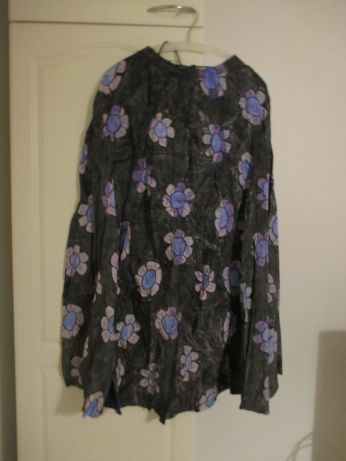
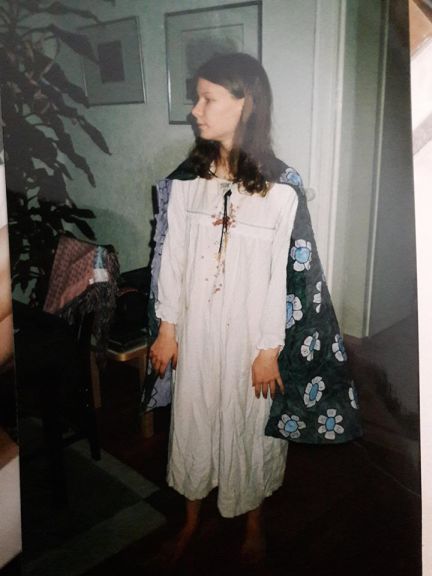
Little Pellicano as Carmilla. I think I must have been 13 or 14 when this party was held.
Then I saw my first Carmilla movie. A Hammer film called Vampire Lovers.
This is a very silly movie. Very cheesy. But young Pellicano loved it. I can still quote many of the scenes from memory. The movie follows LeFanu's novella rather loosely, but I think it's one of the most faithful adaptations. It included the basic ”plot” that Carmilla uses to get close to her victims, has the nightmares (including Carmilla's monstrous cat form), keeps the plot point that she must form her new names anagrammically and makes her killer be a man who lost his daughter to the vampire. So far I think it's the only movie version that includes the scene where Carmilla sees the funeral procession of a girl she killed and loses it completely. I've always found that scene interesting, many claim that her fit of anxiety is caused by hearing the chanting (being unholy creature who's weak to christian things) but I think it's more than that. Either she has horrifying flashbacks to her own funerals (waking to vampirism and having to claw her way out of her own grave, that would scar me for sure) or she is genuinely sorry for killing the girl and terrified of having to face the truth that her love will always end in death.
youtube
I want to interpret Carmilla as a vampire who really loves her victims, not as playthings but as real lovers. But she wasn't a reluctant vampire either, she embraced the monstrous side of herself. It was natural to her, and so it was inevitable that the women she loved would eventually die. Maybe she preferred to ignore this knowledge in the daytime, and when she was forced to see what her night time activities had resulted in, the fit of anxiety happened.
A bit off topic, but one scene from the novella that I've never seen make it into a movie, is when a wandering salesman offers his dentistry services to Carmilla, offering to file down her fangs, which sends Carmilla into a fit of rage. I don't know, I always thought that scene pretty funny. Poor guy, offering to de-fang a vampire and getting a HOW DARE YOU rant in response.
So, the next ”face” of Carmilla was obviously Ingrid Pitt. While this movie wasn't particularly explicit (all the sex happens off screen), the lesbian subtext was much less subtle, which pleased young Pellicano. And then there was the infamous bathing scene (would show pics, but gotta censor for Tumblr. You can easily find them by image googling.).
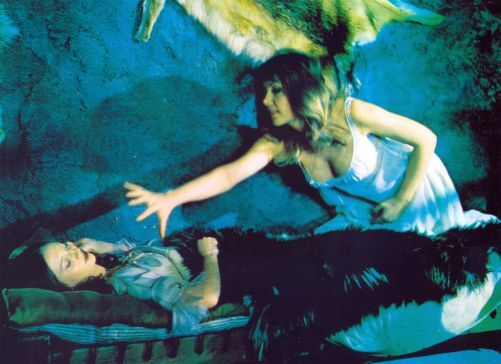
When I was younger, I suffered from being underweight for a long time (had always been a small girl). Seeing Ingrid Pitt's figure motivated me to try to gain weight. She was so beautifully soft and curved, not just her chest, but her shoulders and legs and everything just looked so smooth and nice, while I had thin, pointy, stick-like limbs with sharp edges and none of that lovely roundness. I know teens should not look at celebrities and actresses as body models, but I think having Ingrid Pitt's shape as body goal was healthy for me. I never reached that goal, of course, but I did eventually reach normal weight limits (50kg, the weight needed for blood donors).
That friend of mine, who hosted Halloween parties, watched the movie with me and knew that I was obsessed with Carmilla. One day she got me a fake gold necklace with a red plastic gem on it, shaped like a blood drop. I don't know where she got this trinket from, but it was similar to the pendant Carmilla wears in the movie, and even if it was just cheap junk, I treasured it. And totally wore it during the next Halloween party, going as Carmilla like I always did. I've lost the gold chain, but I still have the gem.
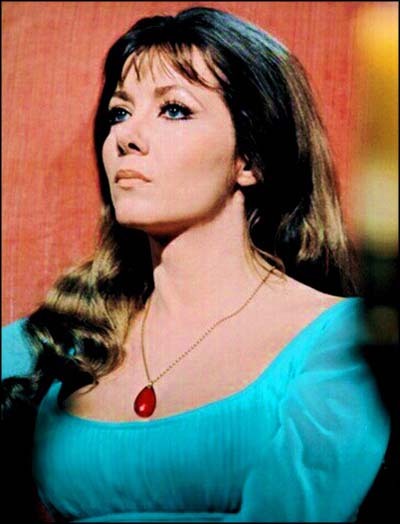
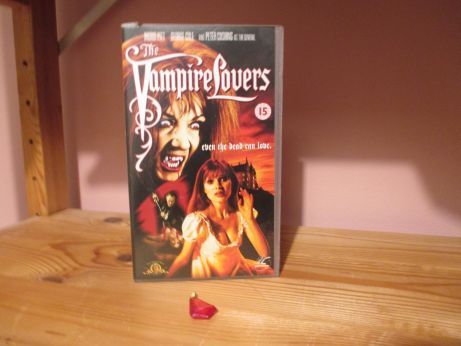
Also still have the VHS. I don't know why I've kept it, I have no VHS player anymore.
Before I move on from Ingrid Pitt, I’d like to mention a pet peeve of mine. Ingrid Pitt has done two vampire roles (three if Elisabeth Bathory from Countess Dracula is counted). The more famous role is obviously Carmilla, it’s probably her most famous role ever, period. Her other vampire role is Carla Lynde from House that Dripped Blood. Now, the thing that annoys me is that article writers tend to always mix these two up. Whenever they write something about Carmilla or female vampires in general, they always mention Ingrid Pitt’s role as Carmilla in Vampire Lovers, but they always use the same damn stupid promo photo that is from House that Dripped Blood. That’s lazy research! Do they just image google “Ingrid Pitt vampire” and fail to check if the photo they use is actually from the movie they’re talking about?! The roles don’t even look identical, Carmilla’s a brunette while Carla Lynde is blonde, Vampire Lovers is set in 1800s, House that Dripped Blood is set in 20th century. The worst one was when the museum in my home city had a vampire themed exhibition and even they used the wrong photo for Vampire Lovers. If a museum can’t get their facts straight, that’s just sad.
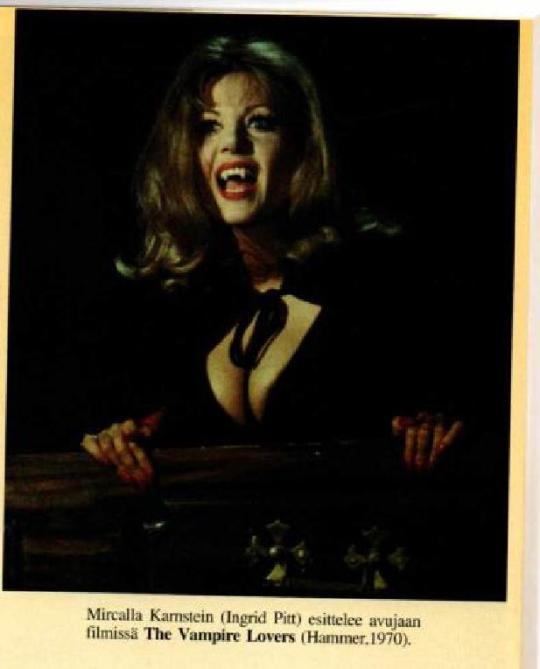
Here is an example of my pet peeve in action, an article about vampire movies, using the wrong fucking photo for Vampire Lovers. And yes, I know why they like using this particular photo (”höhöhöö boobs, I’m so mature”). But that just makes me more angry when they do it.
Hammer made a sequel to Vampire Lovers called Lust for a Vampire. It was... disappointing. It introduced a male love interest for Carmilla, which in my opinion was complete bullshit. If you want to make a story about a female vampire who falls in love with a human boy, by all means make it, but don't call it Carmilla, call it something else. That being said, there were a good amount of lesbian action going on as well (this time Carmilla plotted her way into an all girls' school...) and if there's one thing Hammer rarely fails at delivering, it's the bucketloads of unconvincing bright red fake blood. I skipped the icky het sex, but always enjoyed this scene:
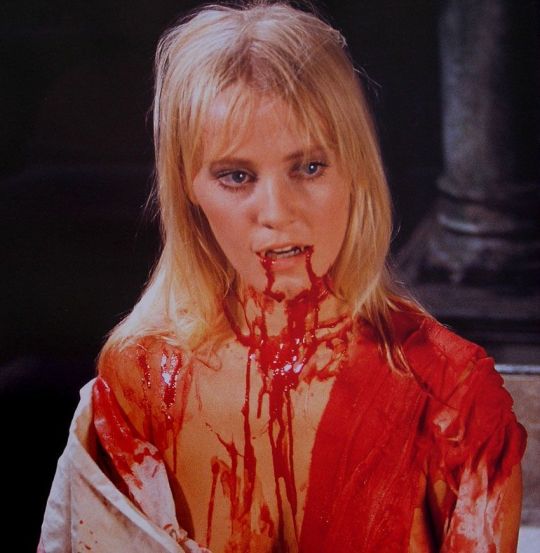
Yeah, Yutte Stensgaard was the third ”face” of Carmilla. When I think of that name, this blood-covered, sleepy-looking vampire maiden is among the images that instantly pop into my mind.
The third Carmilla movie I saw was titled just Carmilla and starred Meg Tilly.

This was clearly a cheaper (maybe made for TV) adaptation. Meg Tilly didn't leave as big an impression as Ingrid Pitt and Yutte Stensgaard did. But I do remember one line from the movie clearly. When Marie (the southerner ”Laura” of this version) asks about Carmilla's past, Carmilla brushes it aside by saying ”That was another lifetime. I'm much happier now.” I adopted this phrase into use. Whenever people are unknowingly asking about a painful thing from my past that I don't want to talk about, I will say it to let them know that nothing good comes from digging old wounds that have already scarred. That was another lifetime. I'm much happier now.

I do remember that Meg Tilly's Carmilla was the movie with the ”awkward floaty blood drinking pose.”
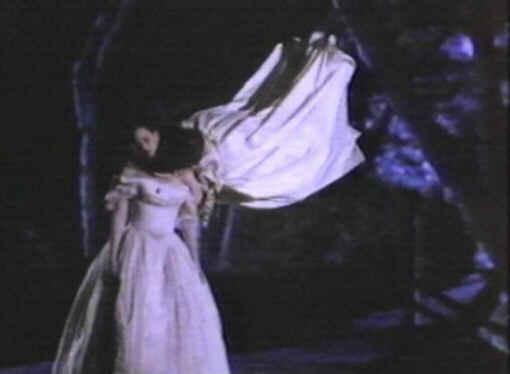
I'm sorry, but that just doesn't look comfortable. Or functional.
Then the big day came – my family got a computer that could access internet. It was an awful piece of junk that could barely be used for writing emails and visiting messageboards. It wouldn't play videos, loading images took forever and big pictures often made it freeze. However, I had access to the internet now. The first word I ever googled was obviously ”carmilla.” Among the sites I found back then, was one about a German play, starring a woman called Ulrike Schneidewind.
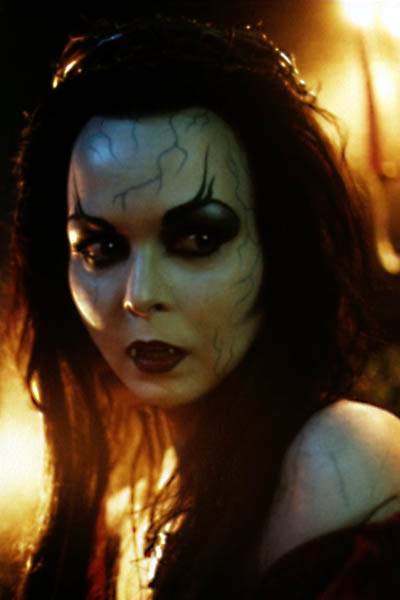
The site had big, beautiful promo photos of the play. They took forever to load, but I returned to watch them often. There was something captivating in Ulrike Schneidewind's look for Carmilla. I'm not usually a fan of vampires with the white face+red lipstick+loads of mascara-look, but hers was beautiful, like a painting, like a creature that really wasn't human.

I don’t know if they used fake blood in the actual play or if it was only for these promo photos, but it looks incredibly pretty and surprisingly convincing.
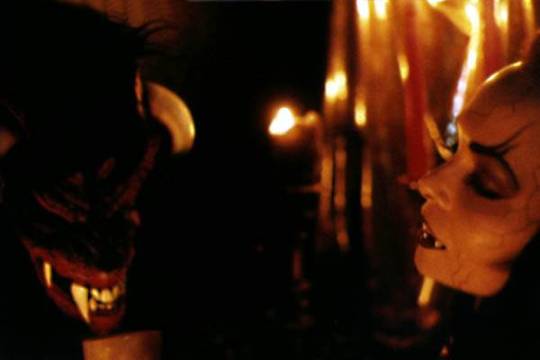
I have no idea what this demon looking thing is supposed to be - Carmilla’s monstrous cat form maybe?
Ulrike Schneidewind became the next ”face” of Carmilla, even though I have never seen her act. All I've seen are these promo photos of the play (I have heard her speak. There's a couple minutes long news clip on Youtube about a vampire lifestyler event she attended). Supposedly there exists a VHS of the Carmilla play they performed on a Romanian tour, but they must have only made a handful of those, since I've never seen it on sale anywhere. I check the German eBay every now and then in faint hopes of finding a copy but I've come to accept that I'll probably never see this show. But still, Ulrike Schneidewind's look left an impression on my mind.
Around those times I started to draw comics in which my self-insert character shared a house with six vampire roommates (Carmilla, who owned the house, Brunhilda from Wake Not the Dead, Teresa from Last Lords of Gardonal, Ruthven, Dracula and Francis Varney) and an OC named Charity (Brunhilda's donor and girlfriend). I mostly pulled the designs for my vampires out of thin air, really (well, Dracula was as he was descrided in the novel, with fuzzy moustache and bushy eyebrows) but Carmilla's design was based on Ulrike Schneidewind's look, with blue veins shining through the white skin and lots of dark makeup and black hair.
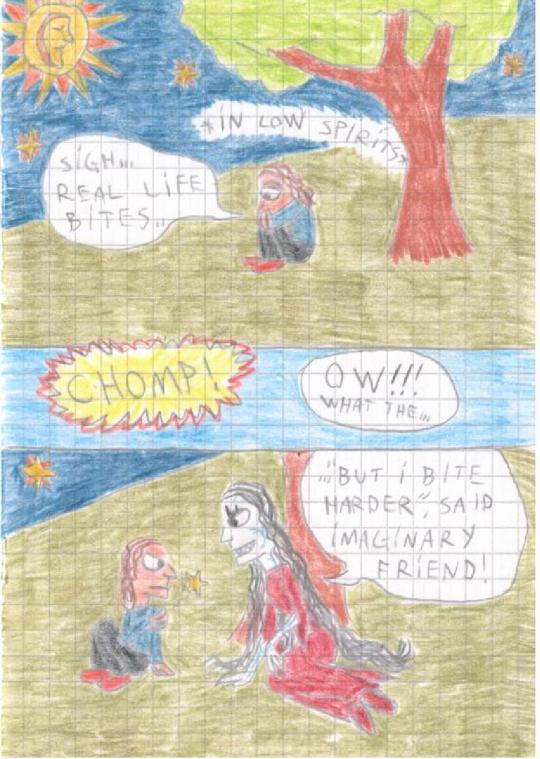
Sad part is that it's been over ten years and my drawing skills have not improved at all. This is not ”art” this is doodles. But drawing these was super fun back then, so I shouldn't feel ashamed of them now, I think.
Besides these comics, I wrote some fanfics too. But I'm very glad I never put those anywhere public, because damn, they are embarrassing to read now. It's because my fanfics were actually serious business, full of drama and sturm und drang, and they turned out rather cheesy. Also full of, ahem, erotic content written by someone who had no personal experience on the subject yet. The comics on the other hand were just made for shits and giggles, and I think they've survived the test of time better (by which I mean, that I have actually shown my comics to other people, because occasionally I think I made a fun one, while I've never shown my fics to anyone and have already burned the worst ones.).
When the wonderland of internet was opened to me, I gained access to all the books in the world. I was no longer restricted by what our library and book stores had, I could buy stuff that wasn't published here. So obviously I got a copy of Kyle Marffin's Carmilla sequel. It's not a very good book. Quite silly, childish and badly written (men really shouldn't write about lesbians, they know nothing about them and enjoying an erotic scene becomes rather hard when you imagine some gross het dude writing it while drooling on his keyboard). But it was the first time I read a rather explicit lesbian sex scene, and that got me very excited, because finally all the subtext was thrown to garbage. Here it was, black on white, proof that Carmilla was into girls, not just their blood but their bodies as well. My late discovery of lesbian erotica may seem weird now, when anyone can gain access to mountains of lesbian smut in the internet, but back when I lived with my parents I never dared to look up smut on the home computer, in fear that they'd find out. Until I moved out, my only access to lesbian erotica was books, and Carmilla's Return was the first one I got.
Rant time: I might also add, that annoyingly enough I had been encountering explicit het sex scenes in books, movies and TV years before. And while I never intentionally searched naughty stuff on the net, I had bumped into het porn there accidentally as well. I wonder if heteros understand how freaking frustrating this kind of thing was. Their smut was all over the place, in every book, every film and all around the net, pretty much rubbed to my face, while MY stuff was so obscure I didn't even know where to look for it. And then they had the nerve to claim that we are ”flaunting it” and ”making it all about ourselves” whenever there was a gay sidecharacter somewhere. Grr. Grrr. Rant over.
I bumped into some incarnations of Carmilla later too, but none left an impression on my mind like these early ones did. The worst Carmilla I ever saw was the main villain in Lesbian Vampire Killers. That movie is easily the worst vampire movie I have ever seen (maybe even the worst movie I've seen, period), it's an ”erotic horror comedy” that is neither sexy, scary or funny. It is nice that when they were thinking of a character to star in a movie about lesbian vampires, they chose Carmilla. But the movie is such utter garbage, I'd rather they'd left my favourite vampire out of it. Save your money and sanity - don't watch this movie. It's bad.
I feel like a lot of time people want to take Carmilla's name and make a whole new character with it (like Reimi Urara's character in Vampire Succession, who is named Carmilla but isn't even a vampire at all). These ”Carmilla in name only” kind of characters don't count, and frankly speaking I'm not that fond of them. I guess it is nice that people want to pay respect to the legendary vampire by naming a character after her, but my opinion still is that if you don't want to tell the story of a lesbian vampire, call your character something else. If you take away either of Carmilla's two passions; that of women or that of blood, the character loses her trademark characteristics and stops being ”real.” You don't make a Godzilla movie where the king of the monsters isn't allowed to have his trademark atomic breath, and you don't make a Carmilla who doesn't love women and blood.
Now that I have said that, you probably guess my opinion about the (*spoilers*) ending of the webseries's third season. Yeah, I wasn't a fan of humanizing Carmilla. So, I went to see the movie with rather low expectations, and was pleasantly surprised. This movie is more Carmilla than all of the webseries's seasons together.
But let's speak about the webseries first. I was very positively surprised by it. One day I ended up googling Carmilla again (was probably looking for fanfics) and discovered this little gem. It had very little to do with Le Fanu's original, but what it decided to change was so good that I didn't care. And it had still lots of little nods to the novella. Carmilla's anagrammical names, the nightmares, they freaking included Laura's governesses De Lafontaine and Perrodon (I would totally watch a spin-off that just follows the adventures of Laf and Perry) and there's even a scene where Carmilla is watching over sleeping Laura, looking a bit similar to a famous illustration of the novella. Also, the theme song ”Love will have it's sacrifices”, is a direct quote, from a scene where Carmilla is describing to Laura the night when the curse of vampirism was passed on to her (of course, she doesn't out right say it, but the reader knows what she's talking about).
”--- I was all but assassinated in my bed, wounded here," she touched her breast, "and never was the same since."
"Were you near dying?"
"Yes, very--a cruel love--strange love, that would have taken my life. Love will have its sacrifices. No sacrifice without blood.---”
I'm not going to say the webseries doesn't have its flaws, a little lazy writing here and there, plot holes and inconsistent characters occasionally (I feel sorry for Danny. She just can't win.). But it was incredibly entertaining, it made me laugh and it made me care about what happens to everyone. And like probably a lot of the fans, I adored the fact that they didn't dance around the lesbian thing. When Laura understands that Carmilla's advances weren't blood-related, her reaction isn't any dumb ”But we're both girls, how can this be?!” Whoever understood to make Laura gay too was a genius. When she gets all flattered and blushing after learning that a beautiful girl finds her attractive, it's such a relatable feeling. It's the lesbian romance I so wanted as a teen! Not stories of a predatory lesbian seducing dumb clueless het girls to the dark side, but girls experiencing all the usual things female leads in romantic stories do, only with another girl as their love interest.
The first season of the webseries is my favourite. The second was pretty good, too. Third, in my opinion, a bit unnecessary (here I think you could see the writing starting to slip). Then came the movie.
They could have completely abandoned the vampire theme and proceeded with the heroes' further adventures. But they didn't and thank goodness for it. They return to draw inspiration from the original source; the novella. We have nightmares, and I admit they actually made me uneasy, reminding me of that creepy feel Laura's dream scenes gave me in the novella. The image of Carmilla laying down in a coffin filled with blood is also from the story. There's a scene where Carmilla is forced to reveal her vampiric nature, and it really reminds me of the scene where it happens in the book.

And they freaking quote it, probably being the first adaptation ever to use straight quotes from the book. ”Die together so they can live together”-speech isn't quite right word-to-word, I think, but still, it's an identifiable quote. I used to be able to quote the ”You are mine, you shall be mine”-speech in English, Swedish and German, but have now forgotten most versions (yeah, I read Carmilla in several languages when I was younger. I was freaking obsessed with the story). I still think it's the most memorable quote from the novella. Also, the book-reading scene with ”Girls are caterpillars who undergo several larval stages before becoming butterflies”-speech is also from the novella. I think the only famous quote missing in this movie is the ”I've never been in love and never shall unless it should be with you”-speech.
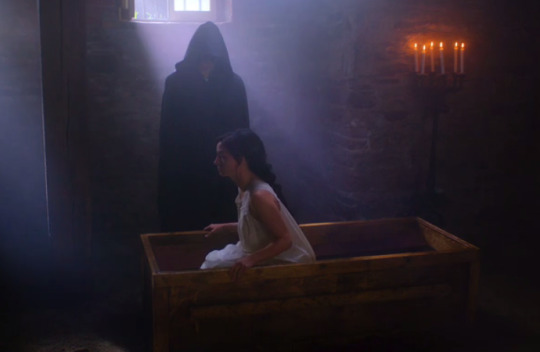
As a fan of the ”old” Carmilla I adore how they pay homage to the origin respectfully, while still making their very own story. Again, teenaged Pellicano would have been all over this stuff. But I had to make my lesbian vampire stories from other versions, and while those also have their flaws, I adore them just as much. I am just happy that Carmilla lives on, not forgotten and left in the shadow of the countless more famous male vampires (seriously, where the fuck are all the female vampires? Ones that are actually main characters in their story and pass the freaking vampiric Bechdel test?)

Carmilla lives on, indeed. She has made a new comeback in Netflix's Castlevania series. I watched the first season and liked it quite a bit. It was a bit too gorey for my personal taste, but that wasn’t a dealbreaker. I liked the art style and was interested to see where they take the story. When I heard rumours that the second season would have a character named Carmilla, my reaction was pretty much “Carmilla is part of the Castlevania franchise?! Why did no one tell me this before?!”
Of course I’m always eager to see new adaptations of my favourite vampire. So, I did some research to know which games she appears in, made some popcorn and sat down to watch some Let’s Play videos (I’m not a gamer and don’t own game consoles so the only way I get to experience videogames is through Let’s Plays in Youtube.). But I ended up rather disappointed. Carmilla in the Castlevania games is cartoonishly silly at best, downright insulting to the original at worst.

So, after seeing how poorly the games treated my favourite vampire, I looked forward to the second season of the Netflix series with mixed feelings. I was hopeful, thinking that they can't go anywhere but up from here. And I was pleasantly surprised. The character design made her a bit silly looking with eeeevil face and her body language is very femme fatale-ish (I don’t really see the appeal of the femme fatale trope, but then again, it’s usually written for male audience), but they didn't put her in an ugly, revealing costume and the camera focused on her face instead of her breasts.
It's disappointing that she isn't a lesbian in this one (she makes one joke that hints she might be into girls too, but because Dracula's war council is mostly one big sausage fest, we don't see her interact with other females much).
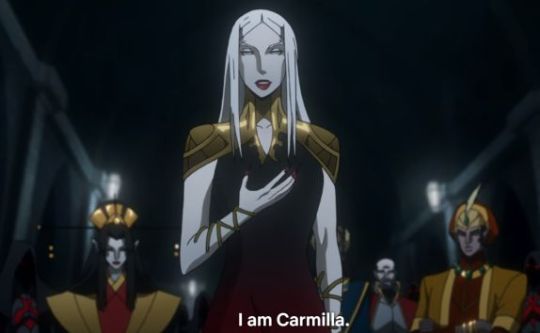
I am so, so happy that the makers of the show understood that Carmilla is not some boot-licking notice-me-senpai Dracula fangirl (an aspect of her I loathed in the games). The only reasons for a lesbian vampire to ally with a male one are if they have a common goal (such as defending themselves against vampire hunters) or if she has no other choice. Netflix Carmilla is the latter. Dracula is a powerful, dangerous monster, who is also very much insane and therefore unpredictable. When he summons Carmilla to join his senseless crusade against humankind, Carmilla can't afford to refuse and take the chance of the mad vampire king killing her for disobedience and making a warning example of her. She has to go to war she herself deems pointless (well, Godbrand had a point in his ”If vampires kill all the humans, what will the vampires eat?”-speech.). So she begins to plot to prevent the genocide (she actually wants humankind to keep existing as opposed to wiping them from the face of the Earth, remind me again why she is the one every fan hates while they love Dracula the Kill All Humans-madman? Oh right, she assaults one of the male fan favourite characters on screen and is therefore deemed much more evil than Dracula who slaughters countless innocent humans offscreen without mercy. Got it.).
I love that she uses cunning instead of seduction when putting her plot to gain freedom from Dracula's servitude in action. Admittedly, some of the scenes where she's manipulating Hector seem a bit seductive-ish, but are still nothing compared to the ”Oh great master let me lick the blood off your sword!”-bullshit from the games. Also, was I the only one who could see right through her mindgames? Every time she complimented some man, I was shaking my head ”Lady, even blind Reetta can see that you are full of shit.” So it really surprised me when Hector fell for it. How do you fall for such an obvious trap?
I like that Carmilla's reasons for her schemes are reasonable and based on common sense and war strategy rather than just being evil for the sake of being evil. That being said, the scene where she beats Hector felt unnecessary, the man was tied up and would have gone with her even without getting his ass handed to him, because he's a prisoner and has no choice. I understand that it's an important scene symbolically, tying back to the scene where the animal-loving Hector compares vampires to cats, to which Isaac points out that cats play cruelly with their prey. It's a turning point for Hector, who abandoned humanity and tried to find a new family among monsters only to realize that they are, well, monsters. What did you expect voting for Leopards Eating Peoples' Faces Party would bring to you? Anyway, I understand that the scene is important to the plot and character growth, but I can't help but feel that making Carmilla assault a fan favourite character so brutally was the writers way of making sure the audience hates her. I have a feeling that they want to be sure the audience hates her, because they have something disgusting in mind for her for the third season.
I already talked about this in my ”If you have to kill female vampires on screen, please don't make it look like a rape”-post. I am worried what they are going to do with Carmilla. She's obviously going to get killed, but I hope they allow her to go down with dignity. Lords of Shadows 2 already gave us a really disgusting, rapey killing scene (I’ve only seen one killing scene with an even clearer “lesbianism can be cured by rape”-theme, in Lesbian Vampire Killers where Carmilla is impaled by a dick-shaped sword), we do not need another. I don't want Hector or Isaac or Dracula impaling her body slowly and looking downward at her in disgust as she painfully dies. Yes, Dracula will be coming back, it's Castlevania after all. I'm also worried of the possibility that instead of killing her, they make Dracula force her back into his servitude, which would also be super gross.
I am happy that the character of Carmilla lives on, that new fans get to experience her with these new incarnations, but whenever a new Carmilla surfaces, I am also a bit worried at how they are going to handle her character this time. I will have to wait and see how the third season of Castlevania ends, until then it is useless to speculate.
#carmilla#vampire#vampire lovers#lust for a vampire#ingrid pitt#yutte stensgaard#ulrike schneidewind#natasha negovanlis#meg tilly
7 notes
·
View notes
Text
Out of the blue I watched a new-to-me movie the other day about a retired Army Colonel who takes on corrupt politicians in his hometown in Georgia. The movie’s title is Colonel Effingham’s Raid, a 1946 comedy directed by Irving Pichel starring Charles Coburn as the title character. Colonel Effingham’s Raid has a lot going for it with charm high on its list of attributes thanks in large part to Coburn, the Georgia native with a talent for comedy and an English accent. It was then that I decided to dedicate an entry to him because I enjoy him so…and…lo and behold, this week would have been his birthday.
Charles Coburn (June 19, 1877 – August 30, 1961)
We have an embarrassment of riches in the character actor department of classic films. There are numerous memorable actors who deserve praise for bettering films simply by their appearance no matter how small a role. One of those is Charles Coburn who enjoyed a popularity many of the other character players did not. Indeed, thanks to Coburn’s 3-decades-long screen career during which he appeared in nearly 100 movies and television shows, his name recognition rivaled that of the stars whose names appeared above the title. Coburn was also highly regarded critically receiving three Academy Award nominations for Best Supporting Actor, taking home Oscar once for his delightful portrayal of Benjamin Dingle in George Stevens‘ wartime comedy, The More the Merrier (1943). More important than awards, however, was Charles Coburn’s undeniable ability to delight greatly with his talent.
Charles Douville Coburn was born in Macon, Georgia on June 19, 1877 and grew up in beautiful Savannah. He was the son of Scotch-Irish Americans Emma Louise Sprigman and Moses Douville Coburn who were not entertainers, but that didn’t stop young Charles from taking odd jobs at the local Savannah Theater starting at the age of 14. He was bitten by the entertainment industry bug early and did everything from handing out programs to being the doorman to theater manager by the age of 18. Failing to make his mark in Georgia, Charles left for New York at age 19. Although Mr. Coburn didn’t hit the big time immediately, his Broadway debut in 1901 was an inevitability as was his forming The Coburn Shakespearean Players in 1905. His partner in that endeavor was another actor, Ivah Wills, who became Mrs. Coburn in 1906. The two had six children together.
In addition to managing the Coburn Players, Charles and Ivah starred in and produced many plays throughout the decades during which the troupe traveled to college campuses across the country and appeared on Broadway. The couple met when he was playing Orlando to her Rosalind in As You Like It. They continued to work together until her death in 1937 performing Shakespeare and French and Greek dramas and comedies. In her book, Greek Tragedy on the American Stage: Ancient Drama in the Commercial Theater …, Karelisa Hartigan mentions how the Coburn Players would give over 100 performances every summer mostly outdoors. The popularity of their performances created an interest in outdoor theaters with other companies following their lead. Charles Coburn played most of the male leading parts with Ivah, billed as Mrs. Coburn, playing the female leads. The productions were often called “amateurish” by critics, but the performances were always praised. These scholarly productions likely led to Charles’ English accent despite being a Southern gentleman.
I’d be remiss not to mention that although few know her name, Ivah Wills had a long list of credits in her own right both as an actor and producer in a career that spanned 35 years. Ivah garnered positive reviews along with her husband and both were highly regarded members of the acting community. To put it in perspective, consider that George M. Cohan was among the honorary pallbearers at Ivah’s funeral.
Cobrun and Wills in The Taming of the Shrew
Ivah and Charles
After Ivah Wills’ death, Charles Coburn moved to Hollywood to start a movie career. He’d already appeared in a 1933 short film and in The People’s Enemy, a crime drama directed by Crane Wilbur. However, the roles that would cement his legacy as a screen star began in earnest in 1938 with comedic performances far removed from his classical training, but roles in which he excelled. Coburn’s best movie roles are the ones where he perfectly balances the high-brow snootiness with a touch of bumbling fool. Roger Ebert described him as a toned down Charles Laughton and that’s exactly right. Coburn paved the road to stardom at the age of 61 and became a steadfast presence that could be counted on for his comedic timing as charming old men with affected manner and accent – always with a monocle, which he removed only to eat, and sometimes chomping on a cigar. One cannot help but smile when he appears on screen.
Clarence Brown‘s Of Human Hearts (1938) offered Coburn his first substantial role alongside a first-rate cast led by Walter Huston, James Stewart and another terrific character actor, Beulah Bondi. Although that film is a Western, Coburn played a doctor, the type of professional role along with several judges, business men, a couple of “sirs,” and rich guys that he enjoyably brought to the screen throughout his career.
Charles Coburn’s memorable big screen credits are too numerous to list, but he made important contributions to such enduring classics as John Cromwell‘s Made for Each Other (1939) and Garson Kanin‘s Bachelor Mother (1939). A personal favorite of mine, Preston Sturges’ The Lady Eve (1941) wherein Coburn plays “Colonel” Harrington, father to Barbara Stanwyck’s Jean Harrington, a duo of card sharps adept at swindling the rich, would not be the same without him. The actor followed that Sturges gem with his first Oscar-nominated performance as an irascible tycoon who goes undercover as a shoe clerk at a department store to try to uncover agitators trying to form a union in Sam Wood’s The Devil and Miss Jones (1941). Starring Jean Arthur, Robert Cummings and a slew of fantastic character actors like Spring Byington, Edmund Gwenn, S. Z. Sakall, and William Demarest, you must make time to watch The Devil and Miss Jones if you’ve not seen it. It is bewitching fun.
Coburn and Jean Arthur in THE DEVIL AND MISS JONES
The 1940s served several standouts for Charles Coburn who appeared in 4 to 5 pictures a year in the early part of the decade. Of course, his Oscar-winning performance in Stevens’ World War II comedy The More the Merrier stands tall above the heap. Opposite Jean Arthur and Joel McCrea, Coburn is wonderful as the retired millionaire who finagles his way into a room during the wartime housing shortage. Coburn’s blustering but endearing manner in this film typifies the greatest gift he brought to the movies, by my estimation, and it is hard to resist. Variety agreed with me as of this movie they wrote, “A sparkling and effervescing piece of entertainment, The More the Merrier, is one of the most spontaneous farce-comedies of the wartime era. Although Jean Arthur and Joel McCrea carry the romantic interest, Charles Coburn walks off with the honors.”
Another worthy 1940s turn for Coburn was Ernst Lubitsch‘s Heaven Can Wait in 1943. Here he plays another grandfather and another millionaire with usual memorable flare alongside a stupendous cast led by Gene Tierney and Don Ameche. Once again I must mention Pichel’s Colonel Effingham’s Raid in which Coburn co-starred with Joan Bennett and William Eythe and several other veteran character actors like Donald Meek and Cora Witherspoon. This was a fun discovery.
Charles Coburn received his third Academy Award nomination for what TCM’s Robert Osborne described as a “rip-roaring performance” as a gruff but loving grandfather in the coming-of-age tale told in Victor Saville‘s The Green Years (1946). Following that performance, Coburn’s big screen appearances slowed down significantly. He had signed a contract with Columbia Pictures in 1945, which required only four films in two years. This meant that the actor had more time to return to the stage and to dedicate time to television work, which he did with gusto starting in 1950 as a premiere guest on many anthology series. Still, Coburn made a few notable pictures in the 1950s delighting audiences with a comedic millionaire performance as Sir Francis “Piggy” Beekman in Howard Hawks‘ Gentlemen Prefer Blondes (1953), a role that could have easily been creepy portrayed by anyone else. He also played against type in John Guillermin‘s murder mystery, Town on Trial (1957), which I must get my hands on.
Coburn with Jane Russell and Marilyn Monroe in a publicity shot for GENTLEMEN PREFER BLONDES
Coburn’s final screen appearance was in The Best of the Post, an anthology series adapted from stories published in the Saturday Evening Post magazine. The March 1960 episode is titled “Six Months More to Live.” That seems a somber ending to a stellar career, but one to be proud of for many reasons not the least of which is that Coburn appeared in five Oscar Best Picture nominees: Kings Row (1942), The More the Merrier (1943), Heaven Can Wait (1943), Wilson (1944) and Around the World in 80 Days (1956). Only the last of these won, but they were all improved by the Coburn brand.
At the time of his death Charles Coburn was married to Winifred Natzka who was forty-one years his junior. The two were married in 1959 and had a daughter together. The actor’s final acting role was fittingly on stage in a production of You Can’t Take It With You in Indianapolis, Indiana a week before his death at the age of eighty-four. The previous year he had been honored with a star on the Hollywood Walk of Fame located at 6268 Hollywood Boulevard. If you ever pass that address be sure to look downward at his star – it was well earned.
A Tribute to Charles Coburn Out of the blue I watched a new-to-me movie the other day about a retired Army Colonel who takes on corrupt politicians in his hometown in Georgia.
4 notes
·
View notes
Photo





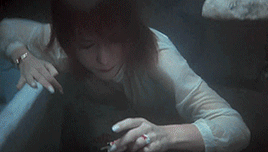
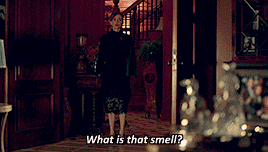

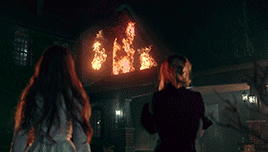
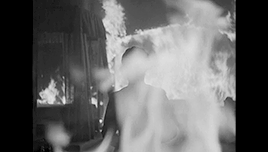
House of Usher (1960), Inferno (1980) and Rebecca (1940)
"the gothic horror story that is cheryl blossom’s life.”
happy halloween!! the time is right to collect these meaningful s1 cheryl moments together and talk about the themes of gothic horror in her narrative.
gothic horror is a huge genre that originates from a style of literature of the late 18th century and on. some examples of famous works are: the raven, frankenstein, dracula, turn of the screw, wuthering heights, and the picture of dorian gray. gothic horror stories usually involve in some way the overlap of death and love, and a mystery that creates suspense or dread while presenting questions about morality. the narratives punish and reward people, especially women, for how sinful or virtuous they are. there may be supernatural or spiritual elements or it may be fully mundane, but it’s always creepy.
items 1 & 2: house of usher is adapted from edgar allan poe’s 1839 short story with a few details changed to give it a romantic plot. in the film, philip, madeline usher’s betrothed, visits her in the decrepit isolated usher family home to bring her away for marriage. but madeline’s brother, roderick, forbids her to leave or to have kids and continue the usher line. the siblings (twins in poe’s original) suffer from a fatal illness that rod claims is passed down per the evil family curse. he wants the curse, which causes inevitable madness, to end with the two of them, the last of their family.
madeline abruptly succumbs and is entombed in the crypt. phil desperately fights against the crumbling house and her strange and controlling brother, looking for a way to understand the curse and her inexplicable illness and sudden death. he finds no explanation except that her death appears to have really been a cataleptic state from which she rises with superhuman strength, busts out of her tomb and goes berserk. she uses the last of her life to strangle her brother as revenge for knowingly burying her alive.
roderick’s guilt for the part he plays in his sister’s fate and the terror that he feels while waiting for her inevitable revenge can be compared to cheryl. her nightmare of jason clawing out of his casket to strangle her is a product of the feeling she later explains at his memorial - guilt and sorrow that she and her family failed to protect jason.
there’s more parallels: the familiar family dress code, and the landscape at large - in the film, the land around the house of usher has been literally poisoned by the family’s curse, generations of evil seeping into the ground itself. in riverdale, the investigation of jason’s murder lifts the veil on the darkness in the town and reveals the part the blossom family has played in the decay.
also at the end a storm or possibly supernatural forces burn the house down.
item 3: lol a very happy halloween to you specifically from that guy. i’m not 100% confident this scene is a reference bc nothing else about this film, inferno, lines up with cheryl or rd s1 (a bullet dodged tbh) BUT it is gothic horror and there’s enough here for me to gif and compare so,
‘girl wearing white has an underwater corpse scare while the audience shouts, what are you doing, don’t do that’ is pretty much the whole parallel. rose, the woman in the film, is not attempting suicide in an icy river and that’s not her brother. she’s. well, she’s looking for her keys that she dropped in a hole in the basement of her building that leads to a room filled with fancy furniture and water. i have no idea whose body that is. it’s just like that sometimes i guess.
this film is like if wes anderson had a gel-lit fever dream of a possessed apartment building populated with b actors, no plot, and a lot of cats that probably wished the american humane association was in europe.
also.... at the end an accident burns the apartment building down.
items 4 & 5: the film rebecca follows an unnamed heroine’s romantic remembrances of a time of uncertainty in her life. she moved into the manor manderlay as the second wife of maxim de winter following the death of his first wife, rebecca. the heroine struggles to make her new marriage work in a house full of the past.
rebecca’s personal maid and confidante, the creepy and manipulative mrs. danvers, has been retained as the head house keeper at manderlay. she obsessively preserves rebecca’s presence in the house and resents the heroine for replacing her.
at the end of the film, after a murder has been solved and all the uncertainties have been cleared, a revelation shows to danvers that her devotion to rebecca was not mutual.
so she decides to burn the house down.
listen, not all gothic horror stories end in a house burning down. just the ones cited in cheryl’s scenes.
it’s difficult to see in that gif - mrs. danvers carries a candle and approaches the second mrs. de winter asleep in front of a lit fireplace, then turns as she thinks about doing some arson. she would “rather destroy manderlay than see [the newlywed couple] happy there.” post-arson, she revels in the flames with fascination. the reference to mrs. danvers in cheryl’s actions is clear.
there’s also, at the point of the s1 finale, a big similarity between rebecca and the deceased clifford blossom: their mysterious deaths, the exoneration of a man through the revelation of their lies, and their influence on others from beyond the grave that is ultimately wiped out with fire.
another thing is, cheryl burns down thornhill “to start over” but also to punish her mother.
a prominent motif in the film is lesbian desire. this isn’t that unusual in the gothic genre which deals a lot with exploring and/or suppressing female sexuality. mrs. danvers’ obsession with rebecca’s attractive qualities is super suggestive. even the heroine’s envy of rebecca is suggestive of desire.
cheryl has been abused by penelope in many ways including, we later find out, being denied the wlw part of her identity. destroying the house where this abuse has taken place, the house which is an asset of wealth for her abuser, is a way for her to escape, get revenge, and begin to take back control of her identity.
ok this is so long. last point. these film references align s1 cheryl with antagonistic and/or doomed characters, not the heroes or survivors. but i think, after her ups and (very concerning) downs in s2, there’s been a shift in her character marked at the beginning of s3. the film rebecca begins with the heroine looking upon the burnt remains of manderlay in a dream and reflecting on the “strange days of [her] life” spent there.
at the thornhill pool party in 3.01 the camera pans from the burnt shell of the house down to cheryl who is also thinking about her past. she is again in parallel to the film but this time to the compassionate heroine. i wonder - will this be the direction of her development this season?
bonus: another rd character with significant gothic horror themes
#riverdaleedit#riverdale meta#cheryl blossom#jason blossom#penelope blossom#chapter 5#chapter 13#joneswuzhere#happy halloween!!#what i learned making these gifs: the more yellow u color a dead body the more unsettling it looks#things that are magenta just aren't as scary as things that are red#OH i forgot to put in this fun fact: claudius' s2 line about visiting the isle of lesbos#MAY be a reference to or is at least following the same practice as#1964 italian gothic horror film il mostro dell'opera (vampire of the opera) in which a girl is said to be 'from lesbo - the sapphic region'#as u know a code for gay#that's a randomly obscure film for rd to be shouting out to but what do i know about the writer's room#filmref
82 notes
·
View notes
Text
Male Fragility and Male Pattern Baldness
14 months, two weeks, one day post-dx
This week, in addition to The Donald, the big news has been... Gillette shaving products. You might know this company for the various shaving-based products they make, or the catchy slogan, “The best a man can get.” Which sounds a little weird and unintentionally homoerotic, but I dislike bleeding when shaving, and, for travel purposes, they have the market for disposable razors.
In the wake of Brett Kavanaugh being confirmed and Cadet Bonespurs still not being called for using the word “pussy” on a live mic (okay, so, even if we want to accept the idea that men talk to each other in the locker room - we don’t, it is the most uncomfortable and awkward environment imaginable - you don’t repeat it in polite company, and YOU DO NOT REPEAT IT IN A TAPED INTERVIEW), it has come to light that America has a problem with massive, throbbing male egos that go unchecked until they inevitably screw up and alienate so many of their victims that Americans vote in loads of sensible, moderate people (previously known as “women,” but that was also when we voted based on gender and class lines instead of a person’s public record). Gillette then changed its slogan to “The best a man can be,” which, I have to admit, is almost as good as “The Most Interesting Man in the World” for aspirational marketing aimed at men. The goal of all this was, presumably, to start a discussion on toxic masculinity and gender roles. Now, I may have some misgivings about this conversation being helmed and instigated by a company with a definite financial and cultural stake in the (patriarchal) status quo, but it’s still a talk we need to have in society. My reaction of vague misgivings and semi-apathy was nothing, however, compared to white men on the Internet. They used all caps to rain impotent fury down upon this perceived slight, that, maybe, we should have a discussion about how framing masculinity only as it brutalizes and disenfranchises others isn’t such a good idea. As someone who’s had his country club privileges revoked but still gets passing privilege, I’d think it’s a discussion worth having, especially if you’re under the rather idiotic impression that your good health and luck will last forever. Now, even though I still stand by the idea that Rousseau was right, and that most of us are mostly-good; at the same time, when you’re forced into a position of vulnerability, people you thought you knew well can reveal themselves to be utter assholes. Yes, pain, torture, and crippling may reveal my inner nature to some extent, but how you treat me in this period is a much more revealing test of your character, dear reader. So, I’m fully prepared to discuss this whole “how you treat the least among you” idea, with the acknowledgment that, as the least among you (sort of), I am fully in favor of toppling the patriarchy and rebuilding it with something less creepy and predatory.
Then I got Rogaine. Full disclosure, Mother Dearest actually got it for me, because I still wear my hair in a rather severe mohawk to cover up the weird, radioactive/thin patches that were scalded off by the nuclear fire (undergoing cancer treatments is like puberty - you change pretty dramatically, physically, and you’re left looking almost, but not quite, like you used to, which is disconcerting to see in a mirror). Normally, the word “regrowth” is not a good one for a brain cancer patient, but, since everything else in my life has been completely upended and vivisected, I figured, “Why not?” In a weird way, even though I’m not in a position I’d wish upon someone I despised (well..), I don’t feel terribly emasculated. After all, how many rounds of chemo and radiation have you gone through? I know I can take a severe beating and get up afterward; even if that beating comes in the form of neurosurgery, radiation, and chemo (I realize my framing of that in terms of violence is probably typical of the problem, but we’re working our way toward other, more humorous topics).
If ever there was a physical embodiment of the sort of mindset that would fee attacked by Gillette’s rather flaccid suggestion we sort of talk about problems with traditional masculinity; it’s Rogaine. First of all, it comes with all these warning labels on it - I am not making this up - saying things like “Not intended for women” or “Not for use by women” (that last one is verbatim). It doesn’t actually go full-blown Alex Jones manthrocyte (or whatever male virility cure he’s hocking this week), nor do the words “male jelly” or “He-Man Woman Haters Club” appear on the box, but it’s amazingly close. What’s especially delightful - to me, anyway - is that a female friend of the family (who has issues with hair stress-related hair loss) is the one who recommended it. However, I am trying to be somewhat more sensible about what I put in myself these days, so I did some quick Internet research (that’s enough to make me an expert on the subject, I figure), and it’s a vasodilator - it’ll open your blood vessels (I still haven’t pieced together how that leads to increased hair growth, but I’m willing to take some things on faith). Apparently, you’re not supposed to take it orally. Which opened up a whole new set of questions, like, 1. What was the study where they found out someone was dumb enough to drink hair tonic? and, 2. If you do drink it, is that some sort of suicide warning? Bearing in mind that this is just the packaging - which, again, I get it’s targeting insecure middle-aged men and/or those of use who want our youthful appearance back while we’re still actually youthful; both of which are vulnerable to suggestion and hesitancy, and maybe they’d turn back at the thought that maybe someone would think less of them for using feminine hygiene products (supposedly, army medics have used tampons to seal wounds in combat, so even the most-feminine of feminine hygiene products is helpful to all genders under the right circumstance), let’s go on to what’s inside the box. Which is a series of bland-looking bottles that are perfect for not indicating someone is insecure about baldness. And an applicator. Let’s hold for a moment. In most medical products - even the CBD/THC oils I take (orally, but maybe I should try them on my hair) the “applicator” is either a glorified eye-dropper or more-glorified Q-tip (side-note: you don’t see Q-tips exclusively marketed to women, even though their most common use is as a mascara applicator)(this is true; you’ve probably been sticking them in the wrong orifice for years). Not so with Rogaine. This comes with - depending on how you look at it - either a miniature turkey baster (perfect for basting Cornish hens), or a Cyclopean eye-dropper. In other words, there’s virtually no way you could screw up where you stick this thing and apply it nasally (again, I’m sure it’s been tried, and they rewrote the warnings and repackaged it). It is, in short, not only catered to male insecurity, it’s designed to completely idiot-proof (I guess they got that one right, most intelligent people wouldn’t be fooled into thinking that fancy, medically-worded hair tonic works)(normally, neither would I, but the woman who recommended it is smarter than me, so I’m willing to try it). It’s the perfect product for Homer J. Simpson.
After drizzling this stuff onto your radioactive-seared flesh, you’ll notice a slight tingling sensation. Either that or just the sensation of something liquid-y runnning over your scalp, I have a lot of scars, so it’s hard to tell. Then... nothing. Admittedly, I’ve only been using it for a few days, Apparently, you have to use it for a month or two before seeing results, at which point you’re either supposed to discontinue use, or, for the truly brave, drink it. Again, I just went 12 months straight with chemo, it’s not like something as minor as not seeing results will be a major deterrent.
For those of you wondering how I do it - go the full 12 rounds of chemo, radiation, and surgery, knowing I will eventually have to repeat it, and eventually lose - that’s how. You have to be able to look at every miniscule step on the path (and not much further ahead) and chuckle at how extraordinarily weird and fucked up it all is. And realize you want to be around to chuckle at the next weird, fucked up moment, even if you have weird, striated baldness on one side.
1 note
·
View note
Text
WandaVision Episode 5 Review: On a Very Special Episode…
https://ift.tt/eA8V8J
This WandaVision review contains spoilers.
WandaVision Episode 5
It seems nearly impossible to follow an episode like “We Interrupt This Program,” but as we hit the midpoint of the season the team behind WandaVision has managed it. WandaVision episode 5 continues directly from where we left off and sets up some interesting potential conflicts both inside and out of Westview. With Monica Rambeau (Teyonah Parris) thrown out of Wanda’s suburban mind palace, she’s back in the not so welcoming arms of SWORD and Director Hayward (Josh Stamberg). While Agent Jimmy Woo (Randall Park) and Darcy (Kat Dennings) couldn’t be happier to see Monica, the rest of SWORD is more concerned with the massive existential threat that is Wanda Maximoff and her puppet town of ghoulish human hostages.
After another sitcom reference heavy opening credits, it seems like we might be back to the format established by the first three episodes. But once SWORD comes into play again we get our first real feel for what the shape of the show will likely look like going forward. There are two dueling realities here, Wanda’s and the world of the MCU that surrounds it. Just like last week, Parris’ Monica is our hero, and a mighty one at that. She’s the kind of complex, thoughtful, and well-drawn female hero that the MCU has often struggled with. Yet here she is and Parris imbues her with a quiet power that almost vibrates off her as she faces down with SWORD Director Hayward. See, the suspicious military man has deemed Wanda a terrorist, and although Monica was her victim, she’s loath to define the former Avenger in the same terms.
This SWORD rift sets up a nice camaraderie between Jimmy, Darcy, and Monica which will hopefully carry over for the rest of the season. If you were loving Dennings as the representation of the theorizing fans among us, then you get more of that here. She even names the Westview anomaly “the Hex,” (for the hexagonal patterns noted in the previous episode) which is a clear reference to Wanda’s Hex Magic in the comics.
But back in the world of Wanda, things are amiss with the kids, with Tommy and Billy magically aging up throughout the episode. If you were wondering how the boys might end up as permanent teenage members of the Young Avengers in the MCU, then wonder no more as they go from babies to five-year-olds and then age up to 10 when it comes to the question of whether or not they’re old enough to have a dog. It’s a creepy and narratively convenient conceit that works to the episode’s advantage.
If you were worried about the momentum slipping after the fast-paced adventure of episode 4, you can breathe a sigh of relief because the juxtaposed stories work well together, crafting something bigger and more expansive than we’ve seen yet. We also get our first examples of those dual realities colliding when Monica attempts to fly a drone in to connect with Wanda. Sadly, she underestimates just how much MCU agents love military weapons and doesn’t realize that the drone is armed.
Yes, evil old Director Hayward tries to shoot Wanda on sight, leading to a showdown on the outskirts of Westview where the Scarlet Witch reveals her full power and plan. This is her home and anyone who tries to take it away will be punished. The most exciting thing that this episode and this exchange sets up, though, is that while Hayward and SWORD might see Wanda as a threat, Monica clearly sees more, and that connection could harbor a safe way out for Wanda when it inevitably all gets too much for her and family.
Speaking of that family, they’re at the core of the action this week, with Wanda writing out most of the supporting cast. The mysterious Agnes (Kathryn Hahn) is still around and we get some hints that maybe she knows a little bit more than she should. Could she be there to help Wanda? Or does she have other plans for the powerful magic user? We’ll have to wait and see.
Elizabeth Olsen has been showing off her range throughout this season but she’s especially strong this week, playing everything from loving sitcom mom to maniacal mutant wielding world destroying hex magic (her accent from Avengers: Age of Ultron even makes a reappearance). But the undeniable truth is that this episode belongs to Paul Bettany. Spending most of the runtime in his human form, he acts the hell out of Vision’s slow realization of what Wanda is up to with emotionally devastating effect.
The tragic romance between Wanda and Vision is at the heart of their namesake series, and we are slowly learning the lengths that Wanda went to reunite them. Not only is she potentially puppeteering Vision’s creepy dead corpse around, but she violently raided a SWORD facility to get it. Now the two are playing a game of marital cat and mouse as Vision tries to uncover Wanda’s plans–in one of the creepiest sequences, freeing Norm from Wanda’s mind prison–and she tries to keep their living paradise secure. Bettany sells every wince of horror and shame as the scales fall from his eyes, and Olsen does a great job at either gaslighting Vision horribly or unconsciously revealing that Wanda might not be in control after all.
The question of Wanda’s control comes into play once again as the episode comes to a close with a huge twist. For months, rumors have persisted that Evan Peters would be joining WandaVision, and it turns out those rumors were true. As Vision finally faces Wanda and tries to demand accountability for her actions, the pair is interrupted by the doorbell. Wanda promises that it’s not her doing, but Vision can’t quite believe her, and who can blame him?
But the biggest secret is who’s behind the door. And, of course, it’s Peters. In a laugh out loud moment, Dennings delivers what will surely become a historic MCU line: “She recast Pietro!?” That she did, or at least someone did, because when Wanda opens the door, Peters is there in an ’80s sitcom approximation of his Fox X-Men Quicksilver garb (sans goggles). Although Wanda’s brother was previously played by Aaron Taylor-Johnson in Avengers: Age of Ultron, it only takes a couple of seconds for her to say “Pietro?”
cnx.cmd.push(function() { cnx({ playerId: "106e33c0-3911-473c-b599-b1426db57530", }).render("0270c398a82f44f49c23c16122516796"); });
So what’s the truth? Has Wanda manifested her brother from another reality? After all, she does give a big speech today about how she can’t bring people back from the dead even if she wants to. Or is someone else pulling the strings? Wanda was telling Vision that “she didn’t know how any of this started” just before the pair were interrupted, so could Pietro be nothing more than a distraction?
We’ll have to wait until next week to find out, but no matter who is controlling Westview one thing is for sure: Disney has officially crossed the streams with their recently acquired Fox X-Men universe and things in the MCU will never be the same…
The post WandaVision Episode 5 Review: On a Very Special Episode… appeared first on Den of Geek.
from Den of Geek https://ift.tt/3cPQkW5
0 notes
Text
Jet Wolf Summarizes Act 43, pt2
The manga and I kind of hate each other. This is unfortunate, but still, I’m determined to come out of this with something. Rather than spend energy on a liveblog that’s increasingly negative, I’m reading each manga act (mostly) silently, and then writing up summaries at the end. I won’t pull my punches. There’s going to be criticism and snark about the manga, either wholesale or in details. If that isn’t a thing you feel like reading, please skip this post!
[READ PART ONE HERE]
So for exactly no reason whatsoever, Rei, Ami, and Mako are wistfully lamenting the absence of the Outer Senshi and the many, many, many times they provided succor to their adoring young counterparts.

Minako says, wondering how much of that vodka she’s gone through. As it turns out, Minako’s hiding a deeper secret. For reasons unknown, she’s lost the ability to transform.
Later, she confesses this to Artemis -- and Luna, and Tiny Kitten who happen to be the room. Minako would, naturally, be completely blasé about sharing deeply upsetting and personal information with them, so this makes perfect sense. Artemis gives Minako a pep talk, beginning with his confidence that Minako has the power inside of her and she can totally do this, and finishing with one of my favourite panels so far.
If you were following my posts earlier today, you know where this is going. We hurtle toward it, unable to alter the course of our destiny, ineffective passengers strapped in our seats and riding the bullet train to hell. It comes.

IT COMES
But I’m going to skip this for a moment. Before I loose my shit entirely, I want to talk about what COULD have been good about this issue. It brings up such an interesting idea, and I would have dearly loved for the manga to have done absolutely any of the work necessary to set this up (see also, This Summary Part One), or follow it through.

What’s blocking Minako from being able to transform isn’t (I’m assuming, this is sort of a two-parter) anything the Dead Moon are doing, it isn’t some fiendish enemy plot. It’s Minako’s own feelings of inadequacy because her friends and teammates won’t shut the fuck up about how awesome and inspiring the Outers are. And, by implication, how unnecessary SHE is.
I have no confidence whatsoever that the manga is going to follow through on this, BUT. I love so much this as a problem Minako has to overcome. She’s finally maybe coming to terms with her own fame and notoriety fading before Usagi, she’s enjoying the benefits of being part of a team rather than going solo. Only there’s this hole in Minako that she’s always trying to fill with the attention and adoration of others. It’s why she wants to be famous, why she wants to be a pop idol or an actress. And in her “real” job, it’s her girls that fill that need. The way they turn to her for confidence and strength, for support and strategy.
Except the fucking Outers are doing all that now, AND THEY AREN’T EVEN HERE.

Minako feels she’s losing the respect of Rei, Ami, and Mako, and it fucks her up so badly that she can’t even transform any more. As you can tell just from these few paragraphs, this idea is SO INTERESTING to me. What it says about Minako, what it says about her feelings for the others. That she gets so immediately obsessed about being special in SOMETHING that she falls right into a blatantly obvious Dark Moon trap. IT’S LITERALLY PRINTED ON THE BUSINESS CARD.

I’ll get back to the actual summary here in a second, as the concept begins to fall apart as the issue wears on. Minako makes increasing stupid and bad decisions, which are by far more of a threat to her credibility as leader than Ami imagining she and Pluto had a conversation once. But the IDEA is so interesting and solid, and as with all the most frustrating things, it’s the unrealized potential in it that gets to me most. Takeuchi CAN come up with really interesting character-driven ideas, she just doesn’t give a fuck most of the time, and nobody in editorial seems to have either the power or the will to hold her feet to the fire to see it through.
OR TO STOP HER FROM MAKING REALLY GOD AWFUL DECISIONS LIKE TURNING ARTEMIS INTO A GODDAMN PERVERT FOR NO FUCKING REASON. Don’t worry, we’ll get there, friends. Oh, we will get there.
So having had enough of listening to the others sucking some quality Outer Senshi dick, Minako runs off. It should be HER dick, dammit, HER DICK. As she’s running and crying, she gets spotted by a talent scout, who invites her to an idol audition. Attention soothes the savage beast, and Minako returns to her friends with a business card and a hair flip. “Minako, this blatantly says ‘Auditions by EvilCo, Death Guaranteed’,” Rei points out. “WHAT’S THAT THEY LOVE ME YOU’RE RIGHT REI NO MORE DICK FOR YOU BYEEEE.”
As soon as she’s out of there though, Minako curses herself for not noticing (IT IS LITERALLY HALF OF THE WORDS ON THE BUSINESS CARD MINAKO), but then decides to turn this into an opportunity to bust the Dead Moon Circus herself and prove she’s a great leader.
BY NOT LEADING ANYONE I’LL NOTE BUT OKAY MINA THAT’S HOW THAT WORKS SURE
When she gets there, though, there are so many people that she isn’t sure she’ll be able to save them all herself. She considers putting out a call for the others, but there’s a problem.

ALONE THEN YES GOOD VERY LEADERLY.
I honestly feel torn between all of this. On the one hand, Minako is CLEARLY not reacting rationally, and that not only makes sense given where she’s at right now, but it’s pretty consistent with Minako’s character to lash out in extreme ways that have absolutely no bearing on good decision making. On the other, I don’t trust Takeuchi’s ability as a writer whatsoever. So is Minako doing this because it’s in-character, or because Takeuchi’s just not thinking it the fuck through? HOW MUCH DO I WANT TO ARGUE THIS SHIT I GUESS IS WHAT I’M ASKING MYSELF.
And the answer is “It’s 7:30 and you’ve been on this one issue since noon”. Yes, good, well argued, Me.
So Minako keeps flying solo through this entire fucked up audition that includes a group of children trapped up on a trapeze platform. YES REALLY

Minako will abandon them for a little bit later, by the way. Since noon, since noon. Right. Moving on.
Everyone at the competition begins to go evil and shit’s not looking good for Minako. She’s about to be crushed by boulders (yes, boulders, I’ve looked five times and I can’t figure out where they come from, just go with it) when Mako shows up out of nowhere, hops between them and Minako, and blasts them into a thousand pieces, because Makoto Kino is all that is good in the world.

ALL. THAT IS GOOD. IN THE WORLD.
Seriously, Mako simultaneously loving Minako enough to be nearly CRUSHED TO DEATH BY BOULDERS to save her, and so pissed off that the first words out of her mouth after are “SHUT THE FUCK UP” is some goddamn A+ Makoto Kinoing. As frustrated and furious as I am at this issue, I give it up for this moment.
The others are pissed because Minako went to fight the bad guys without them, and I just have to say again I would so love if this were an ongoing THING with Minako, that they’ve had honest to god “YOU CANNOT KEEP DOING THIS TO US” talks about it and shit. And you KNOW Minako would lose her shit if any of them did it to her? Imagine her FURIOUS that Rei risked herself by storming off and going it alone, and then Rei calling her right the fuck back on her hypocrisy. How fucking delicious would that be, jesus wept, I want it so much.
ANYWAY WE DON’T HAVE THAT WE HAVE THAT WE HAVE THIS. Under pressure now, Minako tries again to transform, but can’t. Completely unable to face her friends, she runs off again. She pulls herself together though and tries to save the kids. SURPRISE THEY’RE NOT KIDS. Minako’s fallen right into the Quartet’s trap now. They brainwash her to take the ginzuishou from the others, but before she can try, Artemis appeals to her sense of innate goodness and reason.

But the Quartet spring yet another trap! Minako is plummeting to her doom! Artemis saves her again, disregarding all known laws of physics.

And with boulders raining down on Artemis now, that’s where the issue ends.
OKAY SO LET’S TALK ABOUT THE PERVY CAT IN THE ROOM AND HOW FUCKING ENRAGED I AM BY WHAT IT’S DONE
There are SO MANY levels on which I’m so fucking upset and furious about this Artemis thing, including:
Takeuchi’s repeated genuinely distressing thing about animal/human romance
The idea that any meaningful non-familial male/female relationship must inevitably have that element of sexual attraction
EDIT: @docholligay REMINDED ME ABOUT THE CONSTANT CHIBI-USA AND MAMORU SHIT AND I HAD TO SCRATCH THE NON-FAMILIAL PART WHY WERE WE BORN TO SUFFER
Artemis not just violating Minako’s privacy and trust, but sneaking around as he does it, meaning HE HIMSELF knows it’s wrong, he just doesn’t care
The introduction of this as a thing he’s both willing and capable of, forcing the question of how many times he’s done it in the past
The soiling of their friendship and partnership, which is one of my favourites in the entire franchise fuck you so hard Takeuchi
Some extra creepy issues centered around how Artemis is Minako’s MENTOR for fuck’s sake
How it ruins EVERYTHING ABOUT THIS ENDING
I love the idea of Artemis saving Minako. I love that he’s in this with her, looking out for her, believing in her even when she believes in herself so little she can’t even transform. I wish I could just adore everything about this.
BUT I CAN’T
I can’t, because for NO FUCKING REASON I COULD EVER FATHOM, we’ve now introduced lust into their relationship. We now know, incontrovertibly, that some part of Artemis views Minako as sexually desirable. It colours his motives entirely, however much I wish they fucking didn’t. And because it came out of nowhere IN THIS VERY ISSUE, FOR NO APPARENT REASON, it makes it even MORE dubious that there isn’t some part of Artemis trying so hard to save Minako because he’s “in love” with her.
WHY IS THIS EVEN A THING I HAVE TO FUCKING QUESTION NOW WHY WAS IT SO BLOODY NECESSARY TO PUT THIS IDEA OF ALL IDEAS OUT INTO THE WILD
This has utterly fucked Artemis and Minako’s relationship in the manga for me. I can’t unsee this, I can’t wipe it away. THESE HANDS ARE TAINTED. I may have to go try and flush my brain with some Artemis and Minako hijinks from the anime, to try and prevent rot from setting in there, too.
And I’m so ... ANGRY that this is where I am. And why? What payoff could there possibly be? How myopic was Takeuchi that she didn’t see a problem with that? Or that she thought it was what, sweet? Romantic? NOT LITERALLY SKEEVY AS FUCK AND RUINING SOMETHING BEAUTIFUL
That this is a thing I’m having to deal with, though, it’s such a microcosm of the manga for me. It came from nowhere, it wasn’t thought out, it was probably decided on a whim, and it fucking sucks.
I’M SO SO SORRY ARTEMIS
#JW reads Sailor Moon#sm manga dream#sm manga act 43#jet wolf versus the manga#jet wolf summarizes the manga#a novel by jet wolf
70 notes
·
View notes
Note
Re: Your post about if Lister had been written as a woman most of the fans would want her with Rimmer. I would think that would be inevitable & their love story would have been one of the central themes because that's how television works. I also suspect she would have started off with a false-lead love interest in the Kochanski role (Todhunter?) who Rimmer was jealous over. Later, he'd be jealous again over Ace, then Lister would be jealous over Nirvanah, then they'd finally kiss in Terrorform.
I could totally see the show unfolding in this way if the two leads had been male/female as opposed to male/male. I’ve considered writing an AU where Lister is a cis female, and just go through the whole show to see what happens. I always get stuck on Bodyswap though, because I think there’s no way that wouldn’t wind up being creepy, what with Rimmer’s less than respectful attitudes towards female bodies (ie looking at and groping Kochanski’s breast when he hijacked her projection).
18 notes
·
View notes
Text
DYSTOPIA NOW
In this politically inflamed, socially mediated era, large groups of people feel abandoned by society and their government. Alongside such alienation has come a spike in hate crimes triggered by the “fear” of people with different religious, ethnic and economic backgrounds.
More a cry of rage than a real solution, the border wall between the US and Mexico has turned into an ideological litmus test. Ironically, the fact that the wall is actually out for bids seems to have only increased the anger and violence.
This week’s film, The Bad Batch, tracks people in a very near future who are cast out of American society and banished to a desert wasteland.
As they enter the wasteland a sign reads:
“Beyond this fence is no longer the territory of Texas. Hereafter no person within the territory beyond this fence is a resident of the United States of America or shall be acknowledged, recognized or governed by the laws and governing bodies therein. Good luck.”
THE BAD BATCH (2017)
Ana Lily Amirpour (A Girl Walks Home Alone at Night) directs The Bad Batch, a multi-genre mashup of slasher-meets-horror-meets-dystopia- meets-love story.
Leading the way is Arlen (Suki Waterhouse), an apparently wholesome individual who is tossed into the Mexican desert in the film’s opening scene: she is part of the “bad batch”, inferior citizenry who are no longer wanted in the U.S. After briefly wandering the arid flats, she is kidnapped and taken to an encampment called The Bridge, filled with bulked-up steroid abusers; in short order she is chained up and two of her limbs severed for food like other “bad batchers” who have shared the same fate.
Arlen escapes thanks to a Fisher King-style hobo wandering the wilderness (Jim Carrey), and ends up in a second camp, called Comfort– a place of equally metaphoric implications. Comfort houses the real outcasts – immigrants, the mentally ill, the disabled – but on first inspection at least, appears to have rough charm and some form of rubbing-along livability.
Comfort, however, is controlled by a comically sinister cult leader (Keanu Reeves), who urges the inhabitants to “follow the dream” in an excellent deadpan.
BOMBAY BEACH (2011)
“The harder you work, the richer you’ll die.” Maybe this single line justifies the price of admission to Bombay Beach, an eerily compelling documentary about lost souls in a lost place, made by the former music-video director Alma Har’el.
Bombay Beach is the name of a ruined town on the Salton Sea, a saline lake in the middle of Southern California’s Colorado Desert. It was a smart vacation resort in the 1950s and 1960s, but abandoned when the water level rose. Now its seedy chalets and trailers are homes for America’s most needy, like a refugee holding camp for the poor, surreally living in the fragments of a forgotten dream of leisure and prosperity.
Har’el tells the story of three of these marginal souls, and does so with compassion and insight. One man had been arrested just after 9/11 on charges of maintaining what appeared to be a huge weapons and ammo dump in this wilderness. He says he’s no militia extremist, just a regular guy with an American affection for guns. Now he’s out of prison, and his son is addicted to Ritalin and other prescription medication.
An elegant oldster, like a character from a David Lynch movie, makes a living buying discount cigarettes from Native American reservations and selling them at a profit to his neighbors.
A young African-American boy has a future ahead of him with a possible football scholarship to college.
All these lives are recounted with flair and an eye for an exotic tale. It’s a rich slice of Americana, and there’s a great soundtrack from musicians including Bob Dylan.
MAD MAX: THE ROAD WARRIOR (1981)
Director George Miller’s follow-up to his own 1979 hit Mad Max is proof that not all sequels are inferior. If anything, this brutal sci-fi action film is even more intense and exciting than its predecessor, although the state of its post-apocalyptic world has only become worse.
Several years after the deaths of his wife and child, Max (Mel Gibson) has become an alienated nomad, wandering an Australian outback that has fallen into tribal warfare conducted from scattered armed camps.
After a road battle with psychotic villain Wez (Vernon Wells), Max meets up with the odd Gyro Captain (Bruce Spence), who takes him to the camp of a sympathetic group led by Pappagallo (Mike Preston). Since Pappagallo’s people are camped at a refinery, Max plans to take their oil — more precious than gold in this world — but eventually joins them to fight a band of marauders led by the evil Humungus (Kjell Nilsson).
The striking climax features a heart-pounding chase scene involving an oil tanker-truck and a frenzied rush for the coast, with Humungus and his forces in hot pursuit. Nilsson makes a scary villain, with huge muscles and a sinister pre-Jason hockey mask, edited at breakneck pace and staged with manic fury by Miller and stunt coordinator Max Aspin.
TEXAS CHAINSAW MASSACRE (1974)
Tobe Hooper’s film, made over 40 years ago, shocked the nation and gave birth to a new form of horror. The film’s release was troubled and there was increasing pressure to censor or ban the film but it has stood the test of time to become an iconic landmark.
When Sally (Marilyn Burns) hears that her grandfather’s grave may have been vandalized, she and her paraplegic brother, Franklin (Paul A. Partain), set out with their friends to investigate.
After a detour to their family’s old farmhouse, they discover a group of crazed, murderous outcasts living next door who also like to dabble in cannibalism. When the group is attacked one by one by the chainsaw-wielding Leatherface (Gunnar Hansen), who wears a mask of human skin, the survivors must do everything they can to escape.
This film never fails to terrify.
CANNIBAL HOLOCAUST (1985)
Ruggero Deodato’s film was banned and heavily censored across the world; the film’s director was even arrested on its release and the print was seized.
Deodato’s pseudo-documentary follows the plight of four arrogant filmmakers who fly out to the Amazon, in order to film their documentary The Green Inferno, believing that the scenes they capture will buy them inevitable success. They are never seen again.
The footage is recovered by Professor Harold Moore (Francesca Ciardi) who travels to the Amazon and finds the remains of the film crew along with their unseen footage.
The footage reveals their vile treatment of the South American tribe of cannibals who ultimately turned on them. Their brutal deaths at the hands of the tribe becomes the subject of their documentary.
SUSPIRIA (1977)
Dario Argento’s 1977 slasher is arguably the artistic apex of the giallo movement, a horror genre he pioneered along with fellow Italians Mario Bava and Lucio Fulci. This film has become the entry-level key to unlocking the whole genre, featuring its trademark lush, hyperstylized, color-saturated visuals, lashings of gore, its undercurrent of lurid female eroticism and its magnificent score —in this case provided by rockers Goblin and Argento’s “Tenebre.”
The film follows an American ballerina (Jessica Harper) who transfers to a sinister German dance academy covertly run by a satanic coven of witches, including Dark Shadows star Joan Bennett. The mish-mash of languages and accents from the multi-national cast doesn’t matter much since the whole thing was post-dubbed anyway. But once you become attuned to the garishness of Argento’s work, Suspiria is undeniably creepy and haunting, tuning in to burgeoning female sexuailty as a metaphor for a transformation process that is unknowable.
A remake directed by Luca Guadagnino starring Chloe Moritz and Tilda Swinton is being released later this year.
DYSTOPIA NOW was originally published on FollowTheThread
0 notes